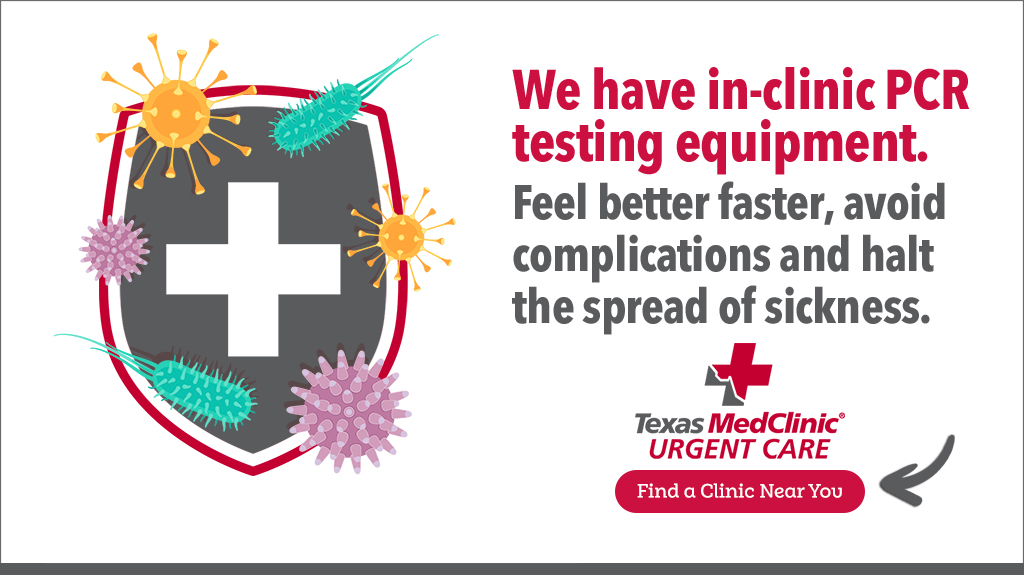Do Antibiotics Work on Colds or Viruses Like the Flu and COVID?
October 20, 2023

Wondering why your medical provider won’t give you antibiotics for the flu or a cold?
It’s a common comment heard from patients. We get it. We’ve all had these illnesses and wanted fast relief. Having a cold or flu is really unpleasant, and the idea of quick resolution is appealing. It’s frustrating when the solution isn’t as easy as a prescription.
Antibiotics are a miracle, but they don’t work unless your illness is due to a bacterial infection. They’re essential for things like for injuries with wounds, strep throat, urinary tract infections, pneumonia, skin infections and other infections that involve bacterial infection concern or risk. But colds, flu and COVID are viruses — bacteria are not to blame.
Why not prescribe antibiotics for a virus?
We’re often asked, “What’s the harm in prescribing an antibiotic ‘just in case’?”
- They’re not going to do anything to help. Here’s why: Antibiotics go on the defense by attacking a bacteria’s cell walls and kills the bacteria. Viruses have a protective protein coating that the antibiotics can’t get through. The best way to attack one is through a pro-active defense, like a vaccine and healthy habits like handwashing. A vaccine stimulates your body to develop antibodies that recognize and fight the virus. That’s why we put such emphasis on getting your flu shot: it’s the best defense.
- Antibiotics come with side effects. Nausea, vomiting and diarrhea are the most common side effects of antibiotics, and though they’re usually short-lived, they’re unpleasant. The main reason for stomach issues is that antibiotics also kill beneficial bacteria that help in your body’s daily battle for health — particularly in your gut. If you’ve taken a probiotic or eaten yogurt, you know about the importance of gut bacteria and your health.
- But the biggest issue? The overuse of antibiotics has created a much larger threat as bacteria essentially “outsmart” the drugs, leaving fewer treatment options when you really need them. This is the greatest risk to you as an individual, to our communities and for that matter, to everyone on this planet.

Here’s a quick explanation: Anytime an antibiotic is used when not needed, it will attack bacteria in your system that weren’t causing you any harm. This gives bacteria a chance to “learn” how the medication works and how to adapt to avoid being wiped out. Antimicrobial resistance is what happens when bacteria develop the ability to fully defeat the drugs designed to kill them. A similar thing happens when you do have a bacterial infection but don’t finish all the antibiotic prescribed. Antibiotic dosages, frequency and length of prescription are based on many decades of research.
The result is an increased likelihood that you could get an infection that can’t be treated with any available antibiotics, which could be life-threatening. That’s why the overuse of antibiotics is now considered one of the world’s most urgent public health problems. (Read more about antimicrobial resistance on the CDC website.)
Treating viruses involves supportive care, symptom management and, in some cases, prescribed antiviral medication.
Why it is still smart to go to a clinic:
Even for a medical professional, it’s difficult to distinguish some illnesses from others without a test. (See our last blog.) For example, a very sore throat could be a lot of things, including flu, RSV or strep throat. Many possible diagnoses won’t respond to antibiotics. However, if it is bacterial, like strep, the sooner you can address it with antibiotics, the better. In fact, you’re likely to feel better in 48 hours if that’s the case. Left untreated, you’re going to feel worse, risk worsening health problems and accidentally get others sick by exposing them.
Other symptoms that could stem from a variety of causes and should be checked out include coughing, congestion, the feeling of exhaustion, headache and fever.
At Texas MedClinic, we have advanced PCR testing equipment on-site that gives our clinicians the information they need to develop an accurate diagnosis and treatment plan. With the right approach to your condition, you can start feeling better faster and avoid spreading the illness.
In addition, anyone with a fever and any of the following symptoms should head this way immediately, as these symptoms could indicate a more serious illness:
- Vomiting or diarrhea.
- Stiff neck.
- Swollen joints.
- Very specific “localized” pain.
- Refusal to drink or signs of dehydration.
- Earache.
- Children under six months should be seen even if they have a fever and no other symptoms.
We wish there was a magical pill to help every patient feel better. When an antibiotic is a solution, it’s an amazing cure. But when they’re not needed, antibiotics do more harm than good. In the US, more than 2.8 million antimicrobial-resistant infections occur each year. For the long-term health of our patients and communities, we avoid unnecessary use of antibiotics to help slow the development of bacterial resistance to antibiotics.
The best way to avoid the flu and COVID, which can’t be treated with antibiotics, is to get your vaccine. We’re now offering flu vaccines at all our clinics. Find the closest clinic to you and walk-in or check-in online.
Reviewed by: Frank Garber, Jr., APRN, FNP-C





